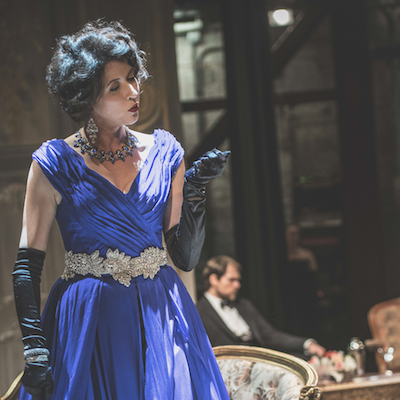INTERVIEW: Opera Philadelphia’s Down-To-Earth Diva Lisette Oropesa
When Lisette Oropesa started studying to play Verdi’s tragic heroine Violetta in La Traviata for Opera Philadelphia, she read the book-turned-play The Lady of the Camellias, which is the source material for Traviata. It’s based loosely on a real story, and it didn’t do much for Oropesa’s nerves.
“It was depressing as can be,” she recalled. “I couldn’t do anything with the role for three months. It was miserable and disgusting.”
But there was another layer to Oropesa’s emotional journey to master Violetta: Her mother, an opera singer herself, has performed the role for years. It was literally in her blood.
“This has been in my psyche for a long time. I think my mom has the most beautiful voice in the world, and whenever I’d see her perform [Traviata], it would make me cry,” she said. “But watching the opera, I could cry all I want. That was the problem at first with actually singing the opera: I couldn’t get through it without crying. This piece is so touching and I get into it. I get that knot right in the back of my throat.”
Clearly, Oropesa’s parents, both Cuban immigrants, instilled the love of music in their daughter early. But despite the influence of her opera-singing mother, Oropesa never wanted to sing professionally: She wanted to play the flute, and studied the instrument for 12 years, from fifth grade all the way through most of her college education, where she concurrently studied voice. It wasn’t until several of her vocal teachers told her that her voice would be the ticket to her success that she gave up the flute. However, those years with the flute were not wasted.
“The reason I am such a solid singer is because of that flute,” she said.
And, clearly, Oropesa’s voice has taken her unbelievably far: She has performed over 100 times at the Metropolitan Opera, and right after her debut at Opera Philadelphia, she’ll be headed to Teatro Real in Madrid to play another Verdi role, Gilda in Rigoletto. I saw Oropesa perform back in 2013 in the Met’s fabulous production of Verdi’s Falstaff as Nannetta, and we talked a bit about that show.
“It was so amazing,” she said. “So much about that show was timing. It’s a comedy and it has to be specific. That production had, like, a million props and there’s a million characters, never mind the chorus and all of those animals! But all that aside, Falstaff is extremely complicated musically. You can’t find a melody to save your life in that show.”
Nannetta in Falstaff is also sweet, innocent, and joyful, which is the polar opposite of Violetta in Traviata. Clearly, Oropesa has had to dive into the depths of a very different character.
“The text and story is pretty straightforward,” she said. “I guess if you want to adopt a post-Freudian mindset, you could interpret it a little differently, but basically, it’s about a woman who is sick and dying at 23, and she’s finally found someone who gives a crap about her while she’s coughing up blood. She doesn’t need anyone to save her because she builds her own sense of security through amassing wealth. Independence for her is material.”
“It’s like Dolly Parton says: ‘It takes a lot of money to look this cheap.’ The problem is, Violetta’s not worth much,” she added.
So, are there any redeeming qualities to Violetta?

Oropesa in “Traviata.” Photo by Andrew Bogard.
“She’s self-sufficient,” Oropesa said “She never lets her emotions get the best of her. She has this earthy strength, which is different than many other women in opera. They are usually always needing someone. She’s not like that. She doesn’t survive and she doesn’t make it to happily ever after. At one point, she tells Alfredo [her lover] ‘I’ll be praying for you from above,’ as if she thinks she’s going to heaven. No one else thinks that!”
“Thank God I did my homework,” she added. “I didn’t want to be the lead and not have my shit together. I really did my work. The first day of rehearsal, our director [Paul Curran] quizzed us on the lines. It was like I was in school and I was going to have a heart attack. I’ve seen performers come in with no continuity. Sometimes you have that luxury to prepare, and sometimes you don’t. If you don’t do your work, you’re left as the cheese who stands alone. The audience knows something is missing.”
No doubt, as the curtain rises this Friday on Opera Philadelphia’s production at the Academy of Music, Oropesa will not be that proverbial cheese standing alone. And, besides, any opera diva who can make a Dolly Parton reference during an interview about Verdi is my kind of actress.


